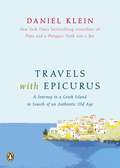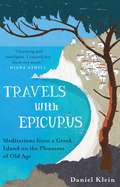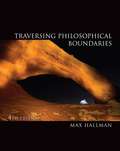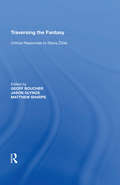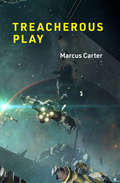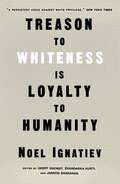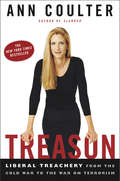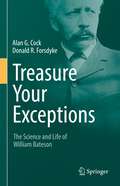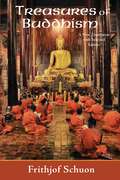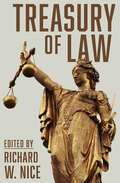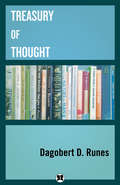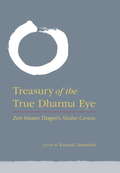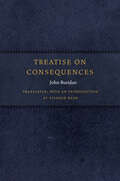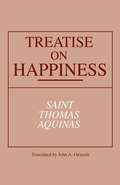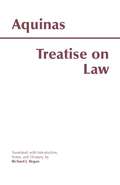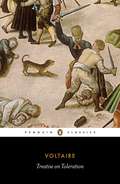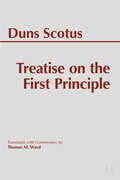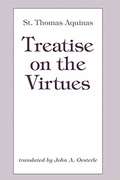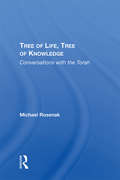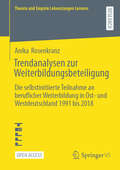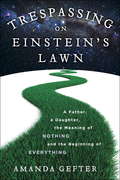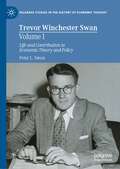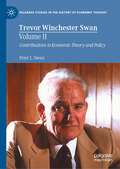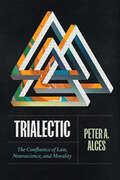- Table View
- List View
Travels with Epicurus
by Daniel KleinOne of the bestselling authors of Plato and a Platypus travels to Greece with a suitcase full of philosophy books, seeking the best way to achieve a fulfilling old age Daniel Klein journeys to the Greek island Hydra to discover the secrets of aging happily. Drawing on the lives of his Greek friends, as well as philosophers ranging from Epicurus to Sartre, Klein learns to appreciate old age as a distinct and extraordinarily valuable stage of life. He uncovers simple pleasures that are uniquely available late in life, as well as headier pleasures that only a mature mind can fully appreciate. A travel book, a witty and accessible meditation, and an optimistic guide to living well, Travels with Epicurus is a delightful jaunt to the Aegean and through the terrain of old age led by a droll philosopher. A perfect gift book for the holidays, this little treasure is sure to please longtime fans of Plato and a Platypus Walk into a Bar and garner new ones, young and old .
Travels with Epicurus: Meditations from a Greek Island on the Pleasures of Old Age
by Daniel KleinOur society worships at the fountain of youth. Each year, we seek to avert the arrival of old age using everything at our disposal, from extreme exercise and botox to pilates and cosmetic dentistry. But in the process, are we missing out on a distinct and extraordinarily valuable stage of life? Daniel Klein ponders whether it is better to be forever young or to grin toothlessly and live an authentic old age. He journeys to the Greek island of Hydra to discover the secrets of ageing happily. Drawing on the lives of octagenarian Greek locals, as well as philosophers ranging from Epicurus to Sartre, he uncovers the pleasures that are available only late in life. An escapist travel book, a witty meditation, and an optimistic guide to living well, this is a delightful jaunt through the terrain of old age, led by a funny and uniquely perceptive modern-day sage.
Traversing Philosophical Boundaries
by Max O. HallmanTRAVERSING PHILOSOPHICAL BOUNDARIES is the most comprehensive multicultural anthology for introductory philosophy on the market today. Addressing six primary philosophical concerns--the self, reality, epistemology, ethics, politics, and religion--this book contains not only many readings from the Western canon, but also essential readings from many cultural perspectives not typically included in introductory philosophy classes. Asian, African, African-American, Latin American, and Feminist traditions are broadly represented and fully integrated into the exploration of these fundamental matters. The text also includes several readings from the sciences, with selections from Charles Darwin, Stephen Hawking, and Jared Diamond.
Traversing the Fantasy: Critical Responses to Slavoj ��k
by Jason GlynosSlavoj Zizek is one of the most provocative and important thinkers writing in contemporary philosophy. This book is an engaged debate with Zizek. It contains a series of specially commissioned critical essays from an impressive collection of contributors covering the full extent of his oeuvre. Essays examine Zizek on cultural theory, film studies, ethics, political theory, social theory, Kant and Lacanian psychoanalysis. In the spirit of Zizek‘s own interventions, these essays critically interrogate his ideas, challenging him to respond directly which he does in an extended polemical reply that concludes the collection. This volume represents an exciting and important contribution to contemporary theoretical debate and adds significantly to the growing literature on Zizek.
Treacherous Play (Playful Thinking)
by Marcus CarterThe ethics and experience of &“treacherous play&”: an exploration of three games that allow deception and betrayal—EVE Online, DayZ, and Survivor.Deception and betrayal in gameplay are generally considered off-limits, designed out of most multiplayer games. There are a few games, however, in which deception and betrayal are allowed, and even encouraged. In Treacherous Play, Marcus Carter explores the ethics and experience of playing such games, offering detailed explorations of three games in which this kind of &“dark play&” is both lawful and advantageous: EVE Online, DayZ, and the television series Survivor. Examining aspects of games that are often hidden, ignored, or designed away, Carter shows the appeal of playing treacherously. Carter looks at EVE Online&’s notorious scammers and spies, drawing on his own extensive studies of them, and describes how treacherous play makes EVE successful. Making a distinction between treacherous play and griefing or trolling, he examines the experiences of DayZ players to show how negative experiences can be positive in games, and a core part of their appeal. And he explains how in Survivor&’s tribal council votes, a player&’s acts of betrayal can exact a cost. Then, considering these games in terms of their design, he discusses how to design for treacherous play. Carter&’s account challenges the common assumptions that treacherous play is unethical, antisocial, and engaged in by bad people. He doesn&’t claim that more games should feature treachery, but that examining this kind of play sheds new light on what play can be.
Treason to Whiteness Is Loyalty to Humanity
by Noel IgnatievA new collection of essays from the bomb-throwing intellectual who described the historical origins and evolution of whiteness and white supremacy, and taught us how we might destroy it.For sixty years, Noel Ignatiev provided an unflinching account of &“whiteness&”—a social fiction and an unmitigated disaster for all working-class people. This new essay collection from the late firebrand covers the breadth of his life and insights as an autodidact steel worker, a groundbreaking theoretician, and a bitter enemy of racists everywhere. In these essays, Ignatiev confronts the Weather Underground and recounts which strategies proved most effective to winning white workers in Gary, Indiana, to black liberation. He discovers the prescient political insights of the nineteenth-century abolition movement, surveys the wreckage of the revolutionary twentieth century with C.L.R. James, and attends to the thorny and contradictory nature of working-class consciousness. Through it all, our attentions are turned to the everyday life of &“ordinary&” people, whose actions anticipate a wholly new society they have not yet recognized or named. In short, Ignatiev reflects on the incisive questions of his time and ours: How can we drive back the forces of racism in society? How can the so-called &“white&” working class be wn over to emancipatory politics? How can we build a new human community?"
Treason: Liberal Treachery from the Cold War to the War on Terrorism
by Ann Coulter“Liberals’ loyalty to the United States is off-limits as a subject of political debate. Why is the relative patriotism of the two parties the only issue that is out of bounds for rational discussion?”In a stunning follow-up to her number one bestseller Slander, leading conservative pundit Ann Coulter contends that liberals have been wrong on every foreign policy issue, from the fight against Communism at home and abroad, the Nixon and the Clinton presidencies, and the struggle with the Soviet empire right up to today’s war on terrorism. “Liberals have a preternatural gift for always striking a position on the side of treason,” says Coulter. “Everyone says liberals love America, too. No, they don’t.” From Truman to Kennedy to Carter to Clinton, America has contained, appeased, and retreated, often sacrificing America’s best interests and security. With the fate of the world in the balance, liberals should leave the defense of the nation to conservatives.Reexamining the sixty-year history of the Cold War and beyond—including the career of Senator Joseph McCarthy, the Whittaker Chambers–Alger Hiss affair, Ronald Reagan’s challenge to Mikhail Gorbachev to “tear down this wall,” the Gulf War, and our present war on terrorism—Coulter reveals how liberals have been horribly wrong in all their political analyses and policy prescriptions. McCarthy, exonerated by the Venona Papers if not before, was basically right about Soviet agents working for the U.S. government. Hiss turned out to be a high-ranking Soviet spy (who consulted Roosevelt at Yalta). Reagan, ridiculed throughout his presidency, ended up winning the Cold War. And George W. Bush, also an object of ridicule, has performed exceptionally in responding to America’s newest threats at home and abroad.Coulter, who in Slander exposed a liberal bias in today’s media, also examines how history, especially in the latter half of the twentieth century, has been written by liberals and, therefore, distorted by their perspective. Far from being irrelevant today, her clearheaded and piercing view of what we’ve been through informs us perfectly for challenges today and in the future. With Slander, Ann Coulter became the most recognized and talked-about conservative intellectual of the year. Treason, in many ways an even more controversial and prescient book, will ignite impassioned political debate at one of the most crucial moments in our history.
Treasure Your Exceptions: The Science and Life of William Bateson
by Donald R. Forsdyke Alan G. CockThis biography provides an understanding of William Bateson as well as a reconciliation of diverging views (e.g. the hierarchical thinking of Gould and the genocentrism of George Williams and Richard Dawkins). Evolutionists may thus, at long last, present a unified front to their creationist opponents. The pressing need for this text is apparent from the high percentages reported not to believe in evolution and the growth of the so-called "intelligent design" movement.
Treasures of Buddhism: A New Translation with Selected Letters
by Frithjof SchuonIn his classic work on the subject, perennialist author Frithjof Schuon explores the vast and varied landscape that is Buddhism. Every reader interested in Buddhism from whatever angle will here find much that speaks to his or her condition. Schuon presents Buddhism not as an historical artifact of the past but as a living spiritual force. In describing the essentials of Buddhism, he frequently makes use of comparisons with other traditions, including Western religious thought. The rich and diverse world of Buddhist art—from its statuary to the tea ceremony—is a subject treated with particular importance. A valuable section on Shinto, the indigenous Japanese tradition of the &“way of the gods&”, concludes the book. This revised edition, containing over 75 pages of new material, features a fully revised translation from the French original as well as previously unpublished selections from Schuon&’s letters and other private writings. Also included is an editor&’s preface, editor&’s notes, a glossary of foreign terms and phrases, an index, and biographical notes.
Treasury of Law
by Richard W. NiceThis anthology of historic legal documents ranges from the ancient Code of Hammurabi to the American Civil Rights Act. In this volume, Richard W. Nice has assembled a wealth of meaningful and significant documents that represent humanity&’s ever-evolving attempt to govern society by imposing laws. Drawn from ancient, medieval, and modern times, this anthology provides an enlightening overview of world history and legal theory, told entirely in primary documents. Some of the earliest attempts to regulate human behavior sprang from powerful, primitive religious influences that governed matters of ethics and morals, such as the Mosaic Code of Palestine. The first &“pure&” law can be traced back to the Law of the Twelve Tables, the forerunner of Roman Law, which in turn had an immeasurable effect on modern Western law. Organized by region and era, Treasury of Law is an essential volume for anyone curious about the evolution of legal codes and practices.
Treasury of Philosophy
by Dagobert D. Runes"Treasury of Philosophy" is a catalog of famous and not so well-known philosophers the world over. Includes Hebrew, Chinese, European and North American as well as other Oriental Philosophers.
Treasury of Thought
by Dagobert D. RunesThis volume is truly and doubly a &“Treasury.&” With its easy to read structure of brief entries in alphabetic order, it is a treasure house of observations on life and death, civilization and savagery, the universe and beyond—the Great Topics which have challenged man&’s thought, whether in passionate public debate or in the lonely stillness of his nights, ever since he first raised his eyes to the stars. At the same time, this is a &“personal treasury&” of the intimate thoughts of an outstanding modern philosopher on these Great Topics.
Treasury of the True Dharma Eye: Zen Master Dogen's Shobo Genzo
by Kazuaki TanahashiTreasury of the True Dharma Eye (Shobo Genzo, in Japanese) is a monumental work, considered to be one of the profoundest expressions of Zen wisdom ever put on paper, and also the most outstanding literary and philosophical work of Japan. It is a collection of essays by Eihei Dogen (1200-1253), founder of Zen's Soto school. Kazuaki Tanahashi and a team of translators that represent a Who's Who of American Zen have produced a translation of the great work that combines accuracy with a deep understanding of Dogen's voice and literary gifts. This eBook includes a wealth of materials to aid understanding, including maps, lineage charts, a bibliography, and an exhaustive glossary of names and terms--and, as a bonus, the most renowned of all Dogen's essays, "Recommending Zazen to All People."
Treatise on Consequences (Medieval Philosophy: Texts and Studies)
by John BuridanThe rediscovery of Aristotle in the late twelfth century led to a fresh development of logical theory, culminating in Buridan’s crucial comprehensive treatment in the Treatise on Consequences. Buridan’s novel treatment of the categorical syllogism laid the basis for the study of logic in succeeding centuries.This new translation offers a clear and accurate rendering of Buridan’s text. It is prefaced by a substantial Introduction that outlines the work’s context and explains its argument in detail. Also included is a translation of the Introduction (in French) to the 1976 edition of the Latin text by Hubert Hubien.
Treatise on Happiness (Notre Dame Series in the Great Books)
by St. Thomas AquinasThe Treatise on Happiness and the accompanying Treatise on Human Acts comprise the first twenty-one questions of I-II of the Summa Theologiae. From his careful consideration of what true happiness is, to his comprehensive discussion of how it can be attained, St. Thomas Aquinas offers a challenging and classic statement of the goals of human life, both ultimate and proximate. This translation presents in accurate, consistent, contemporary English the great Christian thinker's enduring contributions on the subject of man's happiness.
Treatise on Law
by Thomas Aquinas Richard J. Regan S. J.This new translation of the Treatise on Law offers fidelity to the Latin in a readable new version that will prove useful to students of the natural law tradition in ethics, political theory, and jurisprudence, as well as to students of Western intellectual history.
Treatise on Toleration
by VoltaireVoltaire's Treatise on Toleration is one of the most important essays on religious tolerance and freedom of thought A powerful, impassioned case for the values of freedom of conscience and religious tolerance, Treatise on Toleration was written after the Toulouse merchant Jean Calas was falsely accused of murdering his son and executed on the wheel in 1762. As it became clear that Calas had been persecuted by 'an irrational mob' for being a Protestant, the Enlightenment philosopher Voltaire began a campaign to vindicate him and his family. The resulting work, a screed against fanaticism and a plea for understanding, is as fresh and urgent today as when it was written.
Treatise on the First Principle (Hackett Classics)
by John Duns ScotusSeeking what he describes as "the utmost limit of the knowledge our natural reason can achieve . . . concerning the True Existence [that is God]," John Duns Scotus (1265–1308) offers in this treatise one of philosophy&’s most rigorous and ambitious attempts to deduce God&’s existence from purely metaphysical theorems. As elucidated by its concise philosophical commentary, Thomas M. Ward's new translation of the Treatise on the First Principle puts a masterpiece of natural theology within reach of a new generation of English-reading students of philosophy.
Treatise on the Virtues
by Thomas Aquinas John A. OesterleIn his Treatise on the Virtues, Aquinas discusses the character and function of habit; the essence, subject, cause, and meaning of virtue; and the separate intellectual, moral, cardinal, and theological virtues. His work constitutes one of the most thorough and incisive accounts of virtue in the history of Christian philosophy. John Oesterle's accurate and elegant translation makes this enduring work readily accessible to the modern reader.
Tree Of Life, Tree Of Knowledge: Conversations With The Torah
by Michael RosenakFrom the Preface: THE IDEA OF THIS BOOK came to my mind many years ago, after several conversations with my friend and colleague in Jewish educational studies Joseph Lukins professor at the Jewish Theological Seminary in New York. He had suggested that an educated Jew is, among other things, one who lives in some spiritual and cognitive proximity to the weekly Torah reading, the parashat hashavua, "portion of the week." He insisted that issues in the philosophy of education might be in the liturgy's scriptural readings,that even the way messages of tradition divided the Torah into "portions" reflected discrete modes of teaching Torah.In this book, theoretical conceptions, garnered from many places, even if they do not precede reading of Torah, are certainly prisms through which I can read it.
Trendanalysen zur Weiterbildungsbeteiligung: Die selbstinitiierte Teilnahme an beruflicher Weiterbildung in Ost- und Westdeutschland 1991 bis 2018 (Theorie und Empirie Lebenslangen Lernens)
by Anika RosenkranzIn diesem Open-Access-Buch wird untersucht, welche Muster bzw. Veränderungen der selbstinitiierten Teilnahme an beruflicher Weiterbildung sich im Trend identifizieren lassen. Bisherige Analysen, die die Teilnahme Beschäftigter an beruflicher Weiterbildung differenziert nach Ost- und Westdeutschland im Trend betrachtet haben, verweisen auf regionalspezifische Muster. Diese Unterschiede werden punktuell vor dem Hintergrund ost-west-spezifischer Arbeitsmarktkontexte verortet, oft jedoch findet keine Kontextualisierung statt. Inwieweit ost-west-spezifische Entwicklungen der Berufs- und Arbeitsmarktstrukturen Einfluss auf motivationale Aspekte der Teilnahmeentscheidung Beschäftigter nehmen, stand bisher nicht im Fokus. Die vorliegende Arbeit untersucht daher die Teilnahmeselektivität Beschäftigter an selbstinitiierter beruflicher Weiterbildung vor dem Hintergrund ost-west-spezifischer Entwicklungen der Berufs- und Arbeitsmarktstrukturen. Angesichts sich verändernder Kontexte lassen sich veränderte Muster der Teilnahme im Zeitverlauf beobachten. Die Befunde verweisen zudem auf regionale Strukturdifferenzen, die Einfluss auf die selbstinitiierte Teilnahme an beruflicher Weiterbildung nehmen. Insgesamt zeigt sich eine für ostdeutsche Beschäftigte verringerte Teilnahmequote im Vergleich zu westdeutschen Beschäftigten.
Trespassing on Einstein's Lawn
by Amanda GefterIn a memoir of family bonding and cutting-edge physics for readers of Brian Greene's The Hidden Reality and Jim Holt's Why Does the World Exist?, Amanda Gefter tells the story of how she conned her way into a career as a science journalist--and wound up hanging out, talking shop, and butting heads with the world's most brilliant minds. At a Chinese restaurant outside of Philadelphia, a father asks his fifteen-year-old daughter a deceptively simple question: "How would you define nothing?" With that, the girl who once tried to fail geometry as a conscientious objector starts reading up on general relativity and quantum mechanics, as she and her dad embark on a life-altering quest for the answers to the universe's greatest mysteries. Before Amanda Gefter became an accomplished science writer, she was a twenty-one-year-old magazine assistant willing to sneak her and her father, Warren, into a conference devoted to their physics hero, John Wheeler. Posing as journalists, Amanda and Warren met Wheeler, who offered them cryptic clues to the nature of reality: The universe is a self-excited circuit, he said. And, The boundary of a boundary is zero. Baffled, Amanda and Warren vowed to decode the phrases--and with them, the enigmas of existence. When we solve all that, they agreed, we'll write a book. Trespassing on Einstein's Lawn is that book, a memoir of the impassioned hunt that takes Amanda and her father from New York to London to Los Alamos. Along the way, they bump up against quirky science and even quirkier personalities, including Leonard Susskind, the former Bronx plumber who invented string theory; Ed Witten, the soft-spoken genius who coined the enigmatic M-theory; even Stephen Hawking. What they discover is extraordinary: the beginnings of a monumental paradigm shift in cosmology, from a single universe we all share to a splintered reality in which each observer has her own. Reality, the Gefters learn, is radically observer-dependent, far beyond anything of which Einstein or the founders of quantum mechanics ever dreamed--with shattering consequences for our understanding of the universe's origin. And somehow it all ties back to that conversation, to that Chinese restaurant, and to the true meaning of nothing. Throughout their journey, Amanda struggles to make sense of her own life--as her journalism career transforms from illusion to reality, as she searches for her voice as a writer, as she steps from a universe shared with her father to at last carve out one of her own. It's a paradigm shift you might call growing up. By turns hilarious, moving, irreverent, and profound, Trespassing on Einstein's Lawn weaves together story and science in remarkable ways. By the end, you will never look at the universe the same way again.Advance praise for Trespassing on Einstein's Lawn "This is the most charming book ever written about the fundamental nature of reality. Amanda Gefter sounds like your best friend telling you a captivating story, but really she's teaching you about some of the deepest ideas in modern physics and cosmology. Trespassing on Einstein's Lawn is a delight from start to finish."--Sean Carroll, theoretical physicist and author of The Particle at the End of the UniverseFrom the Hardcover edition.
Trevor Winchester Swan, Volume I: Life and Contribution to Economic Theory and Policy (Palgrave Studies in the History of Economic Thought)
by Peter L. SwanThis book, the first of two volumes, explores the legacy of Trevor Winchester Swan, often described as Australia’s greatest ever economist. An insightful biography is accompanied with Swan’s most prominent articles to provide a broad view of his life and work. Particular attention is given to the famous Swan Diagram, known among macroeconomists worldwide, Swan’s four zones of economic unhappiness, his view of how economies grew based on capital deepening and technical progress, and the Solow-Swan model of economic growth. This book aims to shed light on the enigmatic and influential life of Trevor Winchester Swan. It will be relevant to students and researchers interested in the history of economic thought.
Trevor Winchester Swan, Volume II: Contributions to Economic Theory and Policy (Palgrave Studies in the History of Economic Thought)
by Peter L. SwanThis book, the second of two volumes, explores the legacy of Trevor Winchester Swan, often described as Australia’s greatest ever economist. Some of Swan’s most prominent articles are presented alongside analysis of his work from leading historians of economic thought to provide a broad and insightful view of his work. Particular attention is given to Swan’s work on the balance of payments, economic development, capital accumulation, and the neoclassical growth model. This book aims to shed light on the enigmatic and influential life of Trevor Winchester Swan. It will be relevant to students and researchers interested in the history of economic thought and those that want to understand the foundations of modern macro, trade, and neoclassical economics.
Trialectic: The Confluence of Law, Neuroscience, and Morality
by Peter A. AlcesA thought-provoking examination of how insights from neuroscience challenge deeply held assumptions about morality and law. As emerging neuroscientific insights change our understanding of what it means to be human, the law must grapple with monumental questions, both metaphysical and practical. Recent advances pose significant philosophical challenges: how do neuroscientific revelations redefine our conception of morality, and how should the law adjust accordingly? Trialectic takes account of those advances, arguing that they will challenge normative theory most profoundly. If all sentient beings are the coincidence of mechanical forces, as science suggests, then it follows that the time has come to reevaluate laws grounded in theories dependent on the immaterial that distinguish the mental and emotional from the physical. Legal expert Peter A. Alces contends that such theories are misguided—so misguided that they undermine law and, ultimately, human thriving. Building on the foundation outlined in his previous work, The Moral Conflict of Law and Neuroscience, Alces further investigates the implications for legal doctrine and practice.
